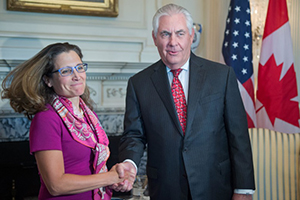September 5, 2017 at Slate.com
Canada Reportedly Wants the U.S. to Scrap Its Right-to-Work Laws as Part of a New NAFTA Deal
By Jordan Weissmann
Canadians are apparently sick of competing with nonunionized foreign workers South of the border. According to the Globe & Mail, the country’s negotiating team is asking the United States to scrap its anti-union right-to-work laws as part of an updated North American Free Trade Agreement, presumably in order to prevent poorly paid Americans from undercutting organized Canadian labor on wages. Obviously, this is not what the Trump administration had in mind when it demanded our neighbors return to NAFTA’s negotiating table.
Right-to-work statutes allow employees to opt out of paying fees to the unions that represent them in collective bargaining. These laws are frequently blamed for draining organized labor of financial resources and have likely contributed to the decline of union organizing over the past several decades. States are permitted to enact the laws under the Taft-Hartley Act of 1947, a landmark piece of union-busting legislation that congressional Republicans passed over President Harry Truman’s veto. Canada, which like the U.S. is seeking to strengthen NAFTA’s labor protections overall, would reportedly appreciate it if Washington would pass new federal legislation banning right-to-work provisions.
“I’m very pleased with the position the Canadian government is taking on labour standards,” Jerry Dias, president of Canada’s largest private-sector union, told reporters outside of this weekend’s NAFTA talks. “Canada’s got two problems: The low wage rates in Mexico and the right-to-work states in the United States.”
To be clear, there is zero chance that a Republican White House would agree to do away with right-to-work laws as part of a trade deal. Breaking the power of organized labor is a key piece of the party’s long-term agenda, and relinquishing that goal in order to appease our lefty neighbors would cause an uproar among the GOP donor class. Canada almost surely knows this, and is staking out an extreme negotiating position in order to signal that it’s treating these talks seriously and is prepared to ask for major concessions.
It’s also an ironic way to throw the Trump administration’s protectionist rhetoric back in its face, which seems like part of the point.
Our president of course loves to complain about cheap foreign labor undercutting American factory workers. And now and then, he has a point. Mexico, for instance, more or less lacks independent labor unions, and partly as a result, wages there have barely risen over the past 15 years, even as auto manufacturing has flourished within the country’s industrializing north. For this reason, the fact that the original NAFTA lacked basic, enforceable labor standards cutting across the U.S., Canada, and Mexico is widely looked at as a mistake, which both the Trump administration and Canada are looking to rectify in the current renegotiations. The Trump administration’s official NAFTA wish list includes enshrining the “Freedom of association and the effective recognition of the right to collective bargaining” among all three countries.
But Canada’s right-to-work jab is a reminder that, for all our talk of raising the rest of the world to our own labor standards, America’s record on workers’ rights isn’t exactly pristine, and that much of the developed world may see a nonunion factory in Alabama much the way we see car plants in San Luis Potosi. In other words, we’re not always the ones being taken advantage of.
https://slate.com/business/2017/09/canada-wants-the-u-s-to-scrap-its-right-to-work-laws.html
